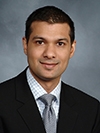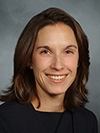Whether you see us in-person or by Video Visit, we're here for you. See how we're keeping you safe.
The Weill Cornell Cleft and Craniofacial Team is approved by the American Cleft Palate-Craniofacial Association.
To make an appointment with our multidisciplinary Cleft and Craniofacial Team, please call 646-962-4321 or send an email craniofacial@med.cornell.edu.
One in every 200 babies born will require specialized care for congenital disorders including cleft lip and palate or craniosynostosis. Even more children need advanced reconstructive surgical care for traumatic injury and other diseases. Weill Cornell Medicine (WCM) Craniofacial Program physicians work together in and out of the operating room to provide seamless care for our patients. Our multidisciplinary teams meet frequently to create a care plan for each patient tailored to their individual needs. New York Presbyterian now has a brand-new state of the art women and newborn center, The Alexandra Cohen Hospital for Women and Newborns. The Alexandra Cohen Hospital for Women and Newborns offer care for high-risk pregnancies and for infants with multiple complex medical issues.
Our goal is to return our pediatric patients back to normal activities as soon as possible. That's why we use the most advanced surgical treatments, including the latest minimally invasive and scar-less surgical techniques. We get children back to the business of being children.
The Craniofacial Brochure
Cleft Lip and Cleft Palate Guide
When a family comes to the WCM Pediatric Craniofacial Center, they see all the specialists they need to see - whether it's two or ten - in one place, in one session. Afterwards, our physicians confer to create a personalized care plan to meet each patient's needs, from the moment of initial consultation through treatment and beyond.
When a patient is referred by a pediatrician, or any medical professional, we make sure to contact them immediately about our recommendations for treatment. We work with all providers to make sure patients receive coordinated and complete care.

Vikash K. Modi, M.D.
Chief of Pediatric Otolaryngology, Associate Professor of Otolaryngology in Pediatrics
Clinical Profile

Caitlin Hoffman, M.D.
Assistant Professor of Neurological Surgery in Pediatrics
Clinical Profile

Kathlyne Purrini, MSN, CPNP
Board-certified Pediatric Nurse Practitioner of Otolaryngology in Pediatrics
Clinical Profile

Michelle M Buontempo, MSN, RN, CCRN, CPNP
Pediatric Neurosurgical Craniofacial Program Coordinator
Weill Cornell Medicine
Vikash K. Modi, MD, is the Co-Director of the Pediatric Craniofacial Team and Director of the Velopharyngeal Center. He is an Associate Processor and Chief of Pediatric Otolaryngology at Weill Cornell Medicine. Dr. Modi is a board certified Pediatric Otolaryngologist, Head and Neck Surgeon and has a particular expertise in cleft palate and velopharyngeal dysfunction. He has performed over 100 cleft palate repairs and has a less than a 5% fistula rate, which one of the lowest in the world. He has been selected as a "Top Doctor in America" by Castle Connolly, "Best Doctor" in New York Family Magazine, and as "Best Doctor" in New York Magazine.
In some cases, surgery is the only effective way to correct a serious craniofacial anomaly. The best surgeons for these conditions are specially trained pediatric neurosurgeons with advanced skills and craniofacial experience, working with an interdisciplinary team of other pediatric specialists. At Weill Cornell Medicine’s Department of Neurological Surgery, our pediatric neurosurgeons provide parents with the confidence they need to make an informed decision about their child's care, offering minimally invasive, endoscopic options whenever possible. For children with craniosynostosis, hemifacial microsomia and other craniofacial anomalies that require surgical correction, our pediatric neurosurgeons work closely with Craniofacial Program specialists to develop individual treatment plans designed to maximize outcomes.
Healthy teeth and gums are essential for children with craniofacial conditions. Many of the surgical and orthodontic interventions for craniofacial patients involve the teeth and gums, and a healthy oral environment is vital to facilitate positive outcomes. Our pediatric dentist is experienced working with children with complex medical issues and craniofacial disorders. Even before your child grows teeth, it's important for a pediatric dentist to assess and monitor jaw growth and development, as well as make timely treatment recommendations and referrals. Regular visits to our pediatric dentist, beginning at age one, can help your child develop healthy teeth.
Our treatments include comprehensive preventative, restorative and surgical procedures, and our pediatric dentist can provide routine dental examinations and cleanings, perform dental filling and extraction procedures, and fabricate prosthetic devices for the mouth. We also have the ability to coordinate and provide care in the hospital operative room setting, if necessary.
Children affected by craniofacial disorders will often experience dental and maxillofacial issues. Our oral maxillofacial team consists of surgeons, pediatric dentists, prosthodontists and orthodontists who use the latest 3D imaging and printing to provide tailored care for each child.
We treat neonates with Pierre Robin sequence requiring mandibular distraction, and also children with cleft lip requiring NasoAlveolar Molding (NAM). Our care extends further to older children requiring corrective jaw surgery, alveolar bone grafting, closure of oral-nasal fistula, functional or interceptive orthodontics and maxillofacial prosthodontics.
Our multidisciplinary craniofacial team prides itself on working together to provide a tailored approach for each patient.
Our pediatric orthodontists focus on the interdisciplinary treatment of patients born with craniofacial conditions, as well as patients with acquired anomalies. Few orthodontists have the skills and experience necessary to treat patients with craniofacial conditions. Our orthodontists have years of training and experience restoring form and function for these patients, planning and delivering treatments that affect the entire face, not just the teeth and jaw
Pediatric orthodontic treatment is usually more complex than normal orthodontic therapy, requiring a coordinated effort across multiples specialties; genetics, pediatrics, otolaryngology, sleep, craniofacial surgery, neurosurgery, plastic surgery, pediatric dentistry, oral surgery, prosthodontics, feeding, speech therapy and child life. Pediatric patient therapy often begins shortly after birth, and extends into the late teen years when facial growth is complete. Treatment varies depending on the specific needs of a patient, but is usually provided in multiple phases at specific stages of growth and development.
Our craniofacial orthodontic specialists provide non-surgical care utilizing a variety of fixed and removable orthodontic and orthopedic appliances. They also aid in the planning of surgical corrections to determine the amount of dental and skeletal movements needed to achieve desired functional and aesthetic results. Often these procedures are goal-oriented based on the specific present and future needs of the individual patient.
Andrew Lemchen, DMD
Facial plastic surgery has the power to significantly improve the lives of pediatric craniofacial patients. Primarily dealing with the soft tissue issues these children face, facial plastic surgery helps to restore form and function to absent or misshapen parts of the face, including the lips, mouth, ears, cheeks and neck. Some procedures can be performed on newborns (ear molding) or infants (cleft lip repair), while others are best performed when a child is older (construction of ears in patients with microtia, or correction of nasal deformities often seen in children with cleft lip). Facial plastic surgery is best performed as part of a comprehensive treatment plan determined by your craniofacial team at Weill Cornell Medicine.
Pediatric obstructive sleep apnea is caused by partial or complete obstruction of the upper airway during sleep. It is associated with multiple adverse consequences affecting neurodevelopment (hyperactivity and learning disabilities), growth (weight gain and linear growth), cardiac function (hypertension) and metabolism (diabetes). The condition is common in healthy children, but is found in higher incidence among infants and children with craniofacial anomalies. Therefore, pediatric sleep specialists are an integral part of our craniofacial team.
The best way to diagnose obstructive sleep apnea is through the review of a child's daytime activities and nighttime symptoms, physical examination, and, ultimately, an overnight sleep study. Sleep studies are performed at our sleep lab, where a child and one parent spend a single night monitored. These studies involve the attachment of leads to monitor sleep quality and structure, breathing effort, oxygen saturation and carbon dioxide levels, heart rhythms, muscle tone and leg movements. A sleep technologist provides continuous monitoring.
Dr. Haviva Veler, board-certified in pediatric pulmonology and sleep medicine, leads our sleep team skilled in the evaluation and management of children with sleep disorders.
Craniofacial disorders, including cleft lip and palate, often lead to abnormal vocal resonance and difficulties with speech production. Vocal resonance refers to the quality of the voice that we hear, based on how sound vibrations travel from the voice box up through the throat, mouth and nose. These vibrations are negatively affected by craniofacial abnormalities, causing either too much or too little air to enter the oral and nasal cavities, and making it difficult for children to produce speech clearly with sufficient oral air pressure. The result is impaired speech production development, abnormal perceptual nasality and poor speech intelligibility.
The treatment of children with craniofacial speech and resonance disorders requires the highly specialized training and interdisciplinary approach that can only be found on a craniofacial team. This specialized approach affords us the ability to determine what treatments are needed, when best to implement them, and what other interventions are necessary, as speech therapy must often be combined with surgical management as well as dental and orthodontic care in order to normalize function.
Speech therapy itself is unique for individuals with craniofacial disorders. The structural differences inherent in these individuals often produce atypical speech production error patterns not responsive to traditional therapy methods. In addition to providing specialized therapy at our facility, our team of speech pathologists are available to guide children's scholastic and private therapists in order to achieve success.
Our physicians specialize in the diagnosis and treatment of congenital anomalies and genetic syndromes inchildren. Wehelp families andreferring physicians assess differences noted prenatally, at birth andduring childhood thatmay affect development or causeother health issues. We also provide comprehensive genetic evaluation, offering state-of-the-art genetic tests and guidance for individualized treatment using a multidisciplinary approach.
Our neuropsychologists conduct evaluations in order to understand your child's cognitive strengths and weaknesses in domains including language, attention, memory, motor coordination, mood and behavior. The results of these evaluations are used to assist you and your referring healthcare provider, therapist or teacher with determination and provision of the appropriate treatment and intervention services for your child's particular needs. We also provide cognitive remediation services to assist adolescents and adults with development and maintenance of compensatory strategies for attention, memory and executive functioning.
Our social worker, in collaboration with our craniofacial team, helps patients and families address psychosocial needs and concerns that may arise during medical care, offering support, counseling, and assistance with identification of community resources. Our social worker can also help alleviate academic concerns, answer insurance questions, accommodate transportation needs, and provide referrals for both individual and family support programs.
Weill Cornell Medicine child life specialists are certified healthcare professionals who specialize in child development and the impact of healthcare on children and their families. Utilizing their expertise to promote coping and understanding, our child life specialists facilitate developmentally appropriate education and self-expression activities to inform children and ease their medical experience. They also employ appropriate diversion techniques, comfort holds, and pain management methods that encourage healthcare compliance and relaxation.
Our child life specialists are also available to support family members dealing with pediatric healthcare experiences. Parents and caregivers have the opportunity to ask their child life specialist for information regarding developmental milestones, health maintenance, as well as social and emotional support. In addition, our specialists recognize the needs of a patient's siblings, and help them to more effectively understand diagnoses and dynamics that affect their family. In recognizing the individual needs of each family member, our child life specialists foster a secure network of support that unequivocally promotes pediatric health and well-being.
As a member of our craniofacial team, our feeding specialist diagnoses and treats oral-motor, feeding and swallowing disorders. Our specialist performs a feeding evaluation, provides guidance and suggestions for improved feeding, and determines whether further testing or additional specialist consultations are warranted. Education and post-surgical feeding recommendations are also provided for patients and their families prior to cleft lip or palate repairs, allowing implementation of strategies prior to surgery to prepare children for the changes. Our specialist also completes a full assessment after surgery is completed to ensure that feedings are going well.
Craniofacial plastic surgery is reconstructive surgery of congenital or acquired bone and soft tissue deformities of the head, skull, face, neck or orbit. A craniofacial condition may include disfigurement from a birth defect (i.e., cleft lip or palate), craniosynostosis, a congenital deformity (i.e., neurofibromatosis) or an acquired defect caused by trauma. Reconstruction of the skull or orbit (eye socket) may be required as part of treatment of benign or malignant tumors of the brain, skull, orbit, face, jaw or neck. Tumors including meningiomas, retinoblastomas and primary or metastatic carcinomas may require surgical removal and reconstruction of both the skull and orbit. Benign lesions from Graves' or Paget's disease may also require this full reconstructive treatment.